:::::::::::::::::::::::::::::::::::::::::::::::::::::::::::::::::::::::::::::::::::::::::::::::::::::
TRIBUTE
Ten years BAGSS: The end of an era, the beginning of a new
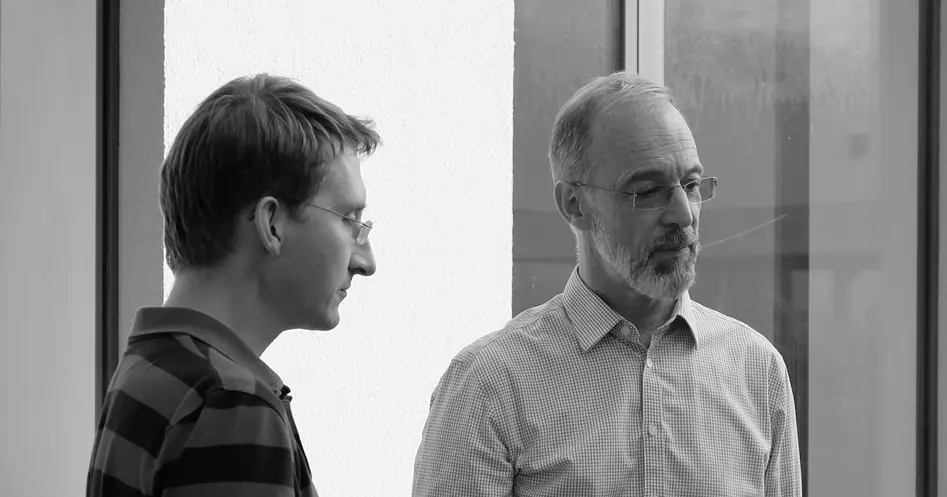
▐ After ten years in office, Thomas Saalfeld resigned from his position as Director of the Graduate School on 30 September 2020 to serve the university as Vice President for Research. There certainly is no better person to talk about the Graduate School than Thomas Saalfeld. He has been there from the very first day as director, faculty member and supervisor but first and foremost as creator and inspirer of the Bamberg Graduate School of Social Sciences. For all of us at BAGSS, this is the end of an era.
Shortly after, Ulrich Sieberer, holder of the Professorship for Empirical Political Science at the University of Bamberg, was elected new Director of the Graduate School. New to the office of Director but not new for us, Ulrich Sieberer has been a faculty member since 2016, serving as member of our Executive Committee and Pillar 4 Coordinator.
On the eve of our ten-year anniversary, the two told us their story about the past and the future of the Graduate School, their visions and aspirations, their past and forthcoming roles. We would like to take this opportunity to thank Thomas Saalfeld for his engagement in and his dedication to the Graduate School and its members. Last but not least, we are looking forward to future challenges and achievements with our new Director Ulrich Sieberer and wish him all the best.◼
:::::::::::::::::::::::::::::::::::::::::::::::::::::::::::::::::::::::::::::::::::::::::::::::::::::
Thomas Saalfeld
I have always drawn strength from working with young scholars aspiring to do excellent, cutting-edge research in their respective fields.
My own vision of BAGSS was one of a cosmopolitan community of researchers, where doctoral fellows were expected to conduct research at the highest level, but would receive a level of support not possible in the environment of an average chair.
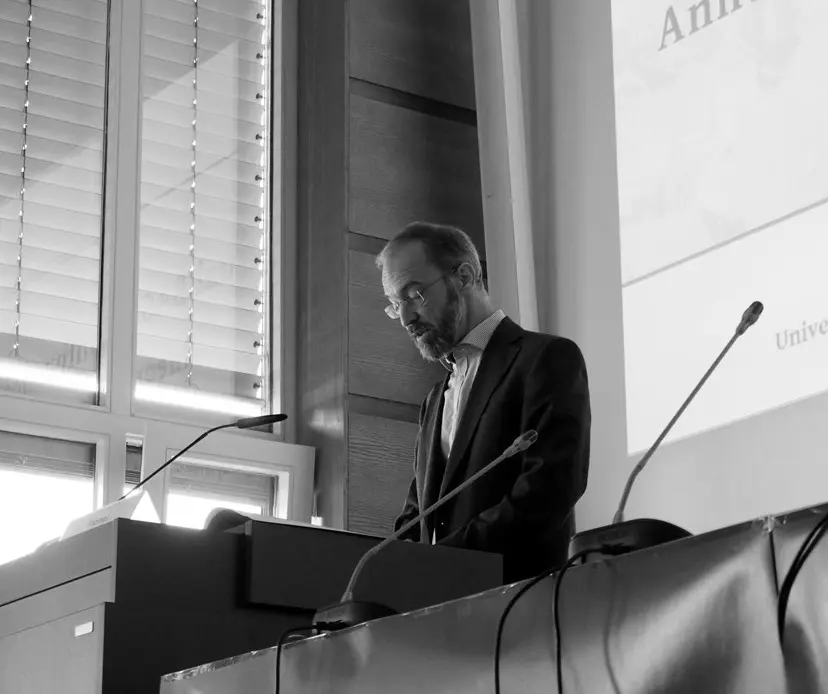
The idea of BAGSS was part of a broader movement towards the establishment of new, more structured doctoral training throughout the German university system. This started around the turn of the century and signalled an attempt to consider doctorates outside the classical framework of a chair. It was an attempt to incorporate lessons from university systems outside Germany and improve the chances of graduates after being awarded their doctorates. My own vision of BAGSS was one of a cosmopolitan community of researchers, where doctoral fellows were expected to conduct research at the highest level, but would receive a level of support not possible in the environment of an average chair. BAGSS fellows are considered as partners who have the opportunity to take ownership of their education and make a very active input into the activities of the School.
Innovative developments in Bamberg encouraged us to establish BAGSS in 2010 as a multidisciplinary graduate school with a clear emphasis on the empirical social and human sciences and a certain focus on questions of longitudinal educational and labour market research. The expansion of BAGSS to an international graduate school with four thematic areas and training Political Scientists, Sociologists, Psychologists, Economists, Demographers, Statisticians and Educational Researchers was only possible through the generous funding we received under the German Excellence Initiative between 2012 and 2019.
Our beginnings were modest. We received some financial support from the University to employ a coordinator. But, our possibilities were quite limited and we were in largely uncharted territory, at least in Bamberg. Our funding under the Excellence Initiative (DFG) allowed us to transform the Graduate School to an international institution for the training of doctoral fellows in the social and human sciences. Since, we had the privilege to select and support extraordinarily talented and qualified doctoral fellows. We also made several successful bids to the German Academic Exchange Service (DAAD) to fund some international fellows. After three or four years of funding, we had developed formats that suited our body of doctoral fellows and began to develop strategies for the longer-term sustainability of BAGSS for the time after DFG funding. We intensified the conversation with the Leibniz Institute for Educational Trajectories (LIfBi) and introduced one-year starter scholarships to give successful applicants time, resources and the support they needed to apply successfully for their own funding for the final years of their doctorate.
When the funding under the Excellence Initiative ended in 2019, we were successful in securing continued funding from the Bavarian State Government. This will allow us to continue an excellent training programme in the future.
The German economy and its university system are in a regional, national and global competition. Our affluence depends on our ability to innovate. This ability, in turn, depends on creative minds with an excellent set of intellectual tools. Well-funded institutions such as BAGSS have a chance to contribute to that. The work of the Graduate School is important because it has a potential to nurture the next generation of creative and responsible academics.
I can say Bamberg’s social sciences benefited from our increased visibility as a place for the promotion of excellent social science research at the highest levels of international excellence. This is reflected in the fact that we won the privilege to host the Winter School in Methods and Techniques of the European Consortium for Political Research (ECPR) for six years.
As a director, faculty member and supervisor, I have had the opportunity to work with a number of remarkably talented doctoral fellows many of whom have graduated with outstanding theses. The ability to recruit external candidates, including candidates from abroad made all the difference.
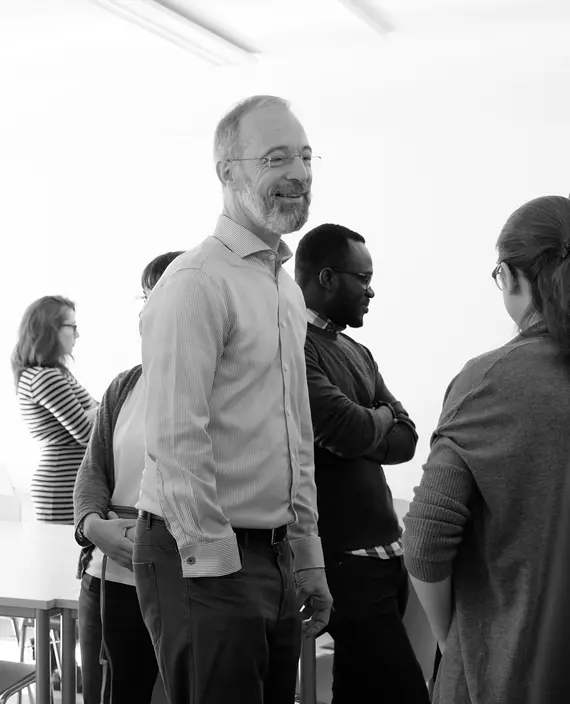
I am certainly proud of the fact that we secured the funding under the Excellence Initiative in 2012 and through the Bavarian State Government in 2019. And I am very proud of the incredible achievements of so many of the early-career researchers we supported.
I have always drawn strength from working with young scholars aspiring to do excellent, cutting-edge research in their respective fields. When I listened to the doctoral students I supervised presenting confidently and competently at the annual conferences of the American Political Science Association or the Midwest Political Science Association, when I heard about the best-paper prizes some of our BAGSS fellows won at conferences, when I heard about the publication of papers whose gestation we could follow in the Graduate School and when I heard the good news about jobs our graduates managed to secure, I have always felt vindicated. It simply makes you feel good.
At a more personal level, I had the privilege to work closely with some admirable and generous colleagues, some of whom have become personal friends. I will miss the day-to-day interaction with the administrative team I have worked with so closely in recent years: I was able to trust them and rely on them with complete confidence. And they forgave me all my shortcomings.
As Vice President for Research, I will have responsibility for the University as a whole – across all faculties and status groups, that is, academic faculty as well as doctoral students. I will work closely with the President, the other Vice Presidents, the Faculties and all Graduate Schools across the University to ensure that the conditions for early-career researchers at the University of Bamberg – inside of BAGSS and beyond – will improve further in the light of our experience and of best practice elsewhere. I intend to remain a professorial member of BAGSS and continue to supervise doctoral students. I hope my schedule will allow me to continue to attend BAGSS Pillar IV seminars and some other BAGSS events. Especially the Pillar IV seminars have often been an inspiration.
:::::::::::::::::::::::::::::::::::::::::::::::::::::::::::::::::::::::::::::::::::::::::::::::::::::
Ulrich Sieberer
I see the graduate school as an institution that, first and foremost, serves the needs of its doctoral and postdoctoral members
Taking on the position as Director is quite an adventure, and I am only beginning to see the ton of things that are constantly going on behind the scenes.
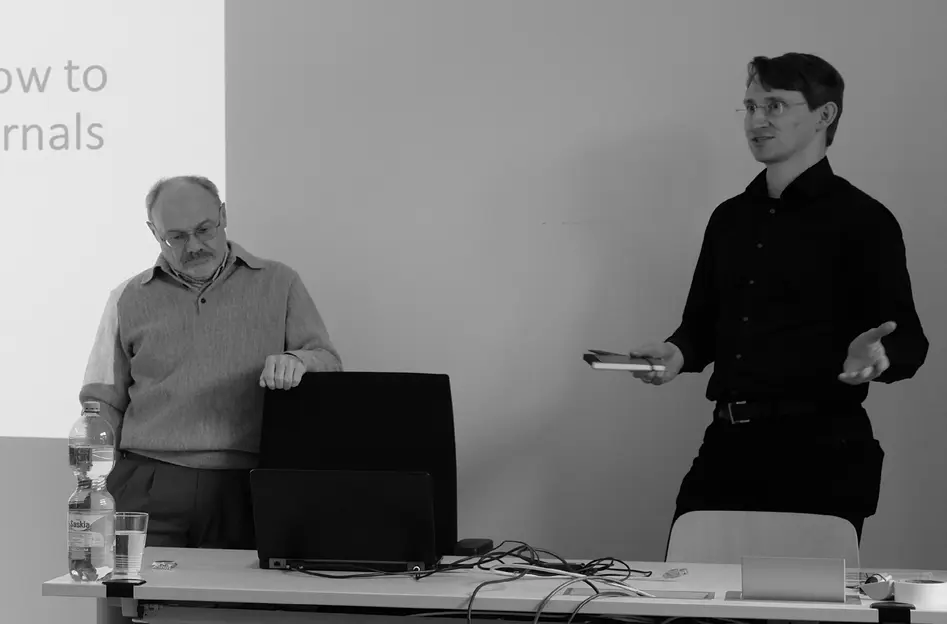
For me, the BAGSS has been one of the most attractive features of the University of Bamberg ever since I came here in 2016. Having experienced two similar graduate schools in Mannheim and Konstanz, I am convinced that a graduate school is a great asset for fostering outstanding doctoral research and a vibrant research environment that mixes researchers across different career stages, from incoming Ph.D student to seasoned professor. Thus, I was excited to be part of this institution. The rooms of my professorship are situated in the BAGSS part of the Feldkirchenstraße, so that also helped in making early contact. In addition, I repeatedly taught the BAGSS Research Design course and the Pillar IV seminar, so I was in constant contact with the BAGSS even before I became a member of the Executive Committee. In that sense, my election as director feels like a next step in an established relationship with the institution.
I think the BAGSS has had a great development over the last decade. It has created an amount of national and international visibility for social and human sciences in Bamberg that is really outstanding for a relatively small university. When you talk to colleagues at international conferences, the name BAGSS and the University of Bamberg really ring a bell as an important research institution with international appeal. The BAGSS has brought young scholars from all over the world to Bamberg who engage in top-notch research and greatly add to the intellectual and social life at the university. Within the university, I think the BAGSS also serves an important function as a laboratory for how a large and multidisciplinary structured doctoral program can be organized. Of course, all of this was greatly facilitated by the generous funding of the Excellence Initiative that allowed us to establish structures with substantial setup costs.
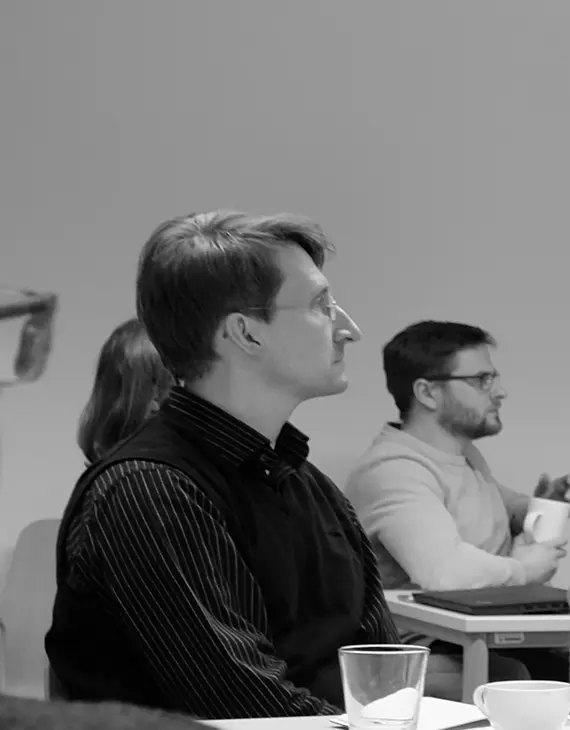
BAGSS as an institution had the good fortune that Thomas Saalfeld as Director and his team invested an incredible amount of enthusiasm, vision, energy, and time in making the very best out of these opportunities. So I think the BAGSS celebrates its tenth anniversary in very good shape.
Now we have entered a new phase with the end of the excellence funding. Thus, we have to adjust the organization and activities of the BAGSS to the new conditions. We have already started implementing some changes such as renewing our by-laws, giving postdoctoral researchers a stronger role in the BAGSS, and strengthening our connection with the LIfBi. This process will continue as we revisit our qualification structure and course program in the next months.
We feel the direct effects of the Covid pandemic, that puts a lot of strain not only on all members individually but also on the BAGSS as a community. We are all yearning for opportunities to interact in person. So while nobody can seriously predict when this will be the case, we are already thinking about ways to bring the BAGSS community together and look forward to a physical restart as well.
For me, taking on the position as Director is a quite an adventure, and I am only beginning to see the ton of things that are constantly going on behind the scenes. I certainly have a lot to learn on the administrative side and am very grateful for the knowledgeable and efficient team we have in the central office. I am very much looking forward to interacting with doctoral students, postdocs and colleagues from all pillars of the BAGSS, especially those with whom I as political scientist have not had as much contact yet. This also includes the LIfBi, as I think the cooperation between these two institutions is crucial for upholding and further strengthening the social sciences broadly defined in Bamberg.
I think the BAGSS has had a fantastic development over the last decade and I hope we can continue developing it as a hub for innovative, internationally oriented research and training of the next generation of scholars. Because, in the end, I see a graduate school as an institution that, first and foremost, serves the needs of its doctoral and postdoctoral members and helps them advance to a level of scholarship that they may not be able to reach without this kind of institutional support.
// Interviews and editing: Sönke Hausleiter und Nasia Pliakogianni
........................................................................................................................................................
MAIN PAGE | CONTACT | LEGAL | PRIVACY POLICY | DATENSCHUTZ | IMPRESSUM
© Bamberg Graduate School of Social Sciences
Image Credits: © Bamberg Graduate School of Social Sciences